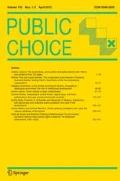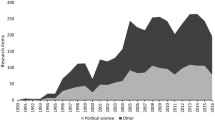Summary
We have sketched a theory of campaign funds. Some funds are supplied by contributors on aquid pro quo basis in exchange for political influence. This supply of funds is actually the demand for influence and is determined by their VMP, which is affected by government discretionary power, by probability of receiving the desired influence, and by the concentration of the beneficiaries. Another supply of funds is actually the demand for “righteousness” and is determined by the MP of a campaign dollar in electing candidates with the desired stands. The demand for funds by politicians is determined by their marginal product in terms of votes. The theory, furthermore, predicts that campaigns will spend themselves into debt because of the fixed-pie nature of the production function.
Owing to limited space, only data on the production function was analyzed. Specification for the 1972 Congressional data included as independent variables expenditures of both parties, incumbency variables, and the Nixon vote in 1968. The Republican vote percentage was the dependent variable. This specification explained two-thirds of the variance in the Senate races and four-fifths in the House races. The MP schedule of expenditures was found to slope sharply downward, which constitutes a major argument for public financing of campaigns.
Similar content being viewed by others
References
The classic in this field is Alexander Heard'sThe Cost of Democracy (Chapel Hill: University of North Carolina Press, 1960). For studies of other countries, see the entire issue of theJournal of Politics, XXV (Nov., 1963), and R. S. Milne, “Political Finance in Southeast Asia with Particular Reference to the Philippines and Malaysia,”Pacific Affairs, XLI (Winter, 1968–69), 491–510.
Gordon Tullock, “The Purchase of Politicians,”Western Economic Journal, X, No. 3 (Sept., 1972), 354–355, Uri Ben-Zion and Zeev Eytan, “On Money, Votes, and Policy in a Democratic Society,”Public Choice, XVII (Spring, 1974), 1–10.
The three empirical studies of campaign monies lack theory and are statistically unsophisticated.Vide P. A. Dawson and J. E. Zinser, “Broadcasting Expenditures and Electoral Outcomes in the 1970 Congressional Elections,”Public Opinion Quarterly, XXXV (Fall, 1971), 398–402; Kristian S. Palda, “Does Advertising Influence Votes? An Analysis of the 1966 and 1970 Quebec Elections,”Canadian Journal of Political Science, VI (Dec., 1973), 638–655; A. H. Taylor, “The Effect of Party Organization: Correlation Between Campaign Expenditure and Voting in the 1970 Election,”Political Studies, XX (Sept., 1972), 329–331.
R. M. Reagan,The Managed Economy (Oxford: University Press, 1963), p. 114.
D. Lynch, “The Concentration of Economic Power,” in K. W. Rothschild,Power in Economics (Baltimore: Penguin Books, Ltd., 1971), p. 158.
Deutsch suggests, “It might be profitable to look upon government somewhat less as a problem of power and somewhat more as a problem of steering; steering is decisively a matter of communications.” Karl W. Deutsch,The Nerves of Government (New York: The Free Press, 1966), p. XXVII. Since some types of communications require large amounts of money (e.g., advertising over the mass media), economics affects the polity through the buying of communication.
For a discussion of political and economic men,vide Edward C. Banfield, “Are Homo Economicus and Homo Politicus Kin?” unpublished mimeograph.
The difference between aquid pro quo contribution and a bribe is legal, not economic. When we speak of such contributions, no distinction is made between the legal and the illegal. For further discussion on the difference,vide Gary Becker's “Crime and Punishment: An Economic Approach,”JPE (March–April, 1968), 169–217.
New York Times, October 11, 1973, p. 37.
Ibid.
The cheating within this cartel does not contradict Ben-Zion and Eytan's conclusion (p. 8) that organized contributors act as a cartel. They refer to situations where government policy is made on an industry-wide basis. Here the influence being bought aids one firm to the detriment of others in the industry.
Wall Street Journal, April 23, 1973, p. 1. The article “IOS's Vesco Hoped Gift to Nixon Fund Would Help With SEC” had the kicker “Quid, No Quo.”
For a similar analysis of lobbying, see Edgar K. Browning, “On the Cost of Government Redistribution, War, and Theft,”Kyklos, XXVII, 374–377, and Gordon Tullock, “More on the Welfare Costs of Transfer,”ibid., pp. 378–381.
ADA Legislative Newsletter, “Advantages of an Incumbent Seeking Re-Election,” II, No. 21 (Dec. 15, 1973), 2. The ADA adds the fund-raising advantage to make a total of $376,000.
Gordon Tullock, “Entry Barriers in Politics,”AER, LV (May, 1965), 459.
Common Cause, “1972 Congressional Campaign Finances” (1974), xerox. The data were compiled from reports of candidates and of political committees submitted to the Secretary of the Senate or the Clerk of the House. Unfortunately, primary and general election expenditures were not differentitated.
The breakdown of the 1968 Presidential race by Congressional district was provided by Michael Barone,et al., The Almanac of American Politics (Boston: Gambit, 1974). This percentage factors out the Wallace vote. It is relatively unbiased because the proportion of the Wallace vote which was Democratic is the same as the proportion of the country which was Democratic. Philip E. Converse,et al., “Continuity and Change in American Politics: Parties and Issues in the 1968 Election,”APSR, LXIII (Dec., 1969), 1091.
Warren Lee Kostroski, “Party and Incumbency in Postwar Senate Elections: Trends, Patterns, and Models,”APSR, LXVII (Dec., 1973), 1213–1234.
Additional information
Because of her assistance, I am indebted to D. K. Wagener. Any errors in this paper are, of course, my own.
Rights and permissions
About this article
Cite this article
Welch, W.P. The economics of campaign funds. Public Choice 20, 83–97 (1974). https://doi.org/10.1007/BF01718179
Issue Date:
DOI: https://doi.org/10.1007/BF01718179




